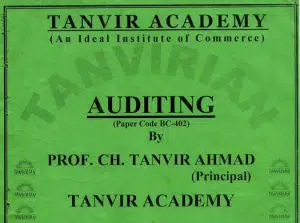Table of Contents
What is Difference Between Accounting and Auditing ? B.com notes Ch. Tanvir Ahmad
Accounting :
” Accounting is an art of recording business transaction in systematic mannerd in the Books of Accounts and to prepare required financial statements at the end of financial year. “”
Auditing :
” Whereas the auditing is the examination of books, vouchers and Documents by and auditor yo satisfy himself that every transaction has been properly recorded and the balance sheet and profit and loss accounts is properly drawn up so as to exhibit a true and fair view of the state of affairs and the earnings of the particular concern. ”
Sequence of Work
Accounting
- Voucher
- Journal
- Ledger
- Trail Balance
- Adjusted Trail Balnace
- Income Statement
- Cash Flow Statement
- Balance Sheet.
Auditing
- Client List
- Ticking
- Casting
- Calling over
- Vouching
- Verification
- Reporting
Difference Between Accounting and Auditing
Acounting/ Accountant
1 . Meanings :
Accounting is an art of interpreting, measuring and communicating the results of economic activities.
2 . Qualification for the Post :
Its is fixed by the business management.
3 . Appointing Authority :
The management committee is authorized to appoint accountant .
4 . Right, Duties & Liabilities :
All are fixed by business management .
5 . Management Influence :
An Accountant is under direct pressure of the business management.
6 principles :
Accounting principles are going concern, accrual, consistency and prudence.
7 . Extent of Work :
Accounting is limited to financial information only.
Auditing / Auditor
1 . Meanings :
The auditing is the examination and checking of accounting records and financial statements .
2 . Qualification for the post:
It is fixed by the law i.e. for companies , the auditor must be a Chartered Accountant with in the meaning of Chartered Accountant Ordinance 1961 i.e member of ICAP.
3 . Appointing Authority :
Owners or securities and exchange commission of pakistan SECP are Authorized to appoint thr auditor.
4 . Right, Duties & Liabilities :
These are fixed by company’s Ordinance 1984.
5 . management influence :
An Auditor is not under direct pressure of the management .
6 . Principles :
Auditing principles are independence Objectivity , full disclosure and materiality .
7 . Extent of Work :
Auditing is related to both financial & non Financial information.

